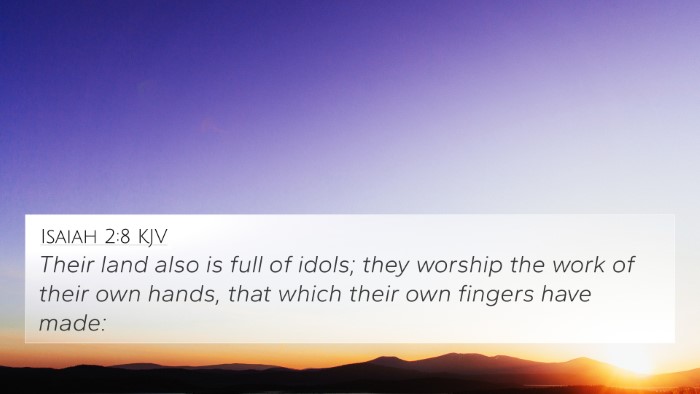Understanding Isaiah 10:11
Isaiah 10:11 states: “Shall I not, as I have done unto Samaria and her idols, so do to Jerusalem and her idols?” This verse presents a significant warning and reflects the prophecy concerning the impending judgment on Jerusalem due to its idolatrous practices. To grasp the full meaning of this verse, we can draw from several public domain commentaries.
Verse Meaning and Commentary Insights
Matthew Henry in his commentary emphasizes the theme of divine judgment in this passage. He explains that God plans to deal with Jerusalem in a manner similar to how He treated Samaria, drawing attention to the seriousness of idolatry in both cultures. This comparison serves as a reminder that God does not overlook the sins of His people. Henry highlights that just as Samaria faced consequences for its spiritual unfaithfulness, so will Jerusalem. Thus, the verse serves to illustrate God’s unwavering justice.
Albert Barnes provides further insight by indicating that the phrase relating to “idols” signifies the worship of foreign deities that the Israelites had adopted. Barnes stresses that the reference to idols signifies not just physical graven images but also the spiritual realities behind them—the unfaithfulness of God’s people to their covenant. Barnes suggests that this is a broader commentary on the failures of Jerusalem, paralleling their actions with those of Samaria, driving home the point that judgment is inescapable.
Adam Clarke elaborates on the historical context, noting that Samaria was already punished for its transgressions. He points out that the people of Jerusalem, upon witnessing the destruction of Samaria due to idolatry, should have learned a lesson. Clarke argues that this verse calls for self-reflection among the people of Jerusalem, insisting that they reconsider their ways before they suffer a similar fate.
Thematic Connections and Cross-References
This verse has several connections with other Bible verses that amplify its message and themes. Here are some critical cross-references:
- 2 Kings 17:24-26 - Describes the consequences faced by Samaria for idolatry, linking back to the warning given in Isaiah 10:11.
- Jeremiah 25:9 - God’s intent to bring judgment on those who stray from His commandments resonates with the message of this verse.
- Hosea 8:5-6 - Further emphasizes Israel's idolatry and its dire consequences, connecting with the themes in Isaiah.
- Micah 1:6 - Reflects on the destruction of Samaria and its parallels to Jerusalem's fate if it does not repent.
- Isaiah 1:29 - Relates to the point made in Isaiah 10:11 about the inevitable outcome of turning away from God.
- 2 Chronicles 28:1-3 - Offers additional context for the idolatrous practices of Jerusalem, aligning with the prophetic declaration of Isaiah.
- Ezekiel 23:4-5 - Portrays the spiritual infidelity that can be equated with the idols referenced in Isaiah.
Cross-Referencing Biblical Texts
The insights from Isaiah 10:11 stress the importance of using cross-references to grasp the complete narrative of God’s dealings with His people. Cross-referencing Biblical texts enables the reader to navigate through similar themes such as judgment, idolatry, and divine justice throughout scripture.
Tools for Bible Cross-Referencing
To delve deeper into these connections, several tools for Bible cross-referencing are available:
- Bible concordances for topical searches.
- Bible cross-reference guides that highlight interconnections between verses.
- Cross-reference Bible study methods that explore themes and theological implications.
- Bible reference resources that assist in identifying thematic links.
- Comprehensive Bible cross-reference materials for detailed studies.
Conclusion
In conclusion, Isaiah 10:11 serves as a poignant reminder of the spiritual state of God's people and their need to remain faithful. The extensive commentary from various scholars reflects the depth of meaning in this verse. By engaging with cross-references, one can uncover a broader understanding of scripture and the recurrent themes of judgment and idolatry in God’s narrative.
"Thus, in studying Isaiah 10:11, let us consider not only its immediate meaning but also its place within the larger biblical framework, connecting it with the themes and lessons of faithfulness and divine justice present throughout the scripture."





